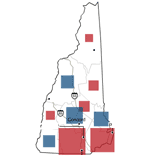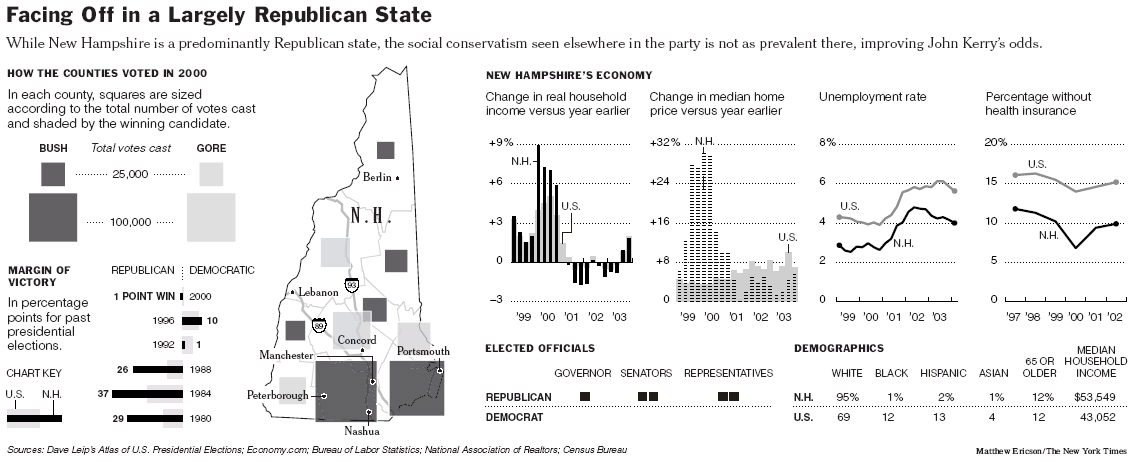
Published: August 8, 2004
Article originally published at http://www.nytimes.com/2004/08/08/politics/campaign/08newhamp.html

 ETERBOROUGH, N.H. - If Senator John Kerry defeats President Bush in this state, where Democrats are badly outnumbered, it will be because of voters like David and Elizabeth Scattergood.
ETERBOROUGH, N.H. - If Senator John Kerry defeats President Bush in this state, where Democrats are badly outnumbered, it will be because of voters like David and Elizabeth Scattergood.
The Scattergoods, who owned a security alarm business in this southwestern New Hampshire town and are now retired, are lifelong Republicans who voted for Mr. Bush four years ago. But they say that they simply cannot abide the war in Iraq and Mr. Bush's environmental policies, and that for the first time, they will vote in November for a Democrat for president.
"We're conservative people," said Mr. Scattergood, 82. "We just don't like what's going on in this country."
"We don't believe the war in Iraq was justified," he continued. "And Bush is so anti-environment. He favored vehicles in the national parks that are known to create pollution. He's done everything for the oil industry. It's really sad for someone our age to see what's happening and to think about our grandchildren and what they're going to be faced with."
At last count, only about 175,000 of New Hampshire's registered voters, or 25 percent, were Democrats; 260,000 (38 percent) were independents, and 250,000 (36 percent) were Republicans.
But a statewide poll by the University of New Hampshire Survey Center, released the week before the Democratic National Convention last month, showed Mr. Kerry slightly ahead of Mr. Bush, 47 percent to 43 percent, though his lead was still within the margin of error. Another 4 percent favored Ralph Nader, and 6 percent were undecided.
The race is so close that the months before the November election may be as lively here as the presidential primaries that put New Hampshire in the political spotlight every four years. Both campaigns say they plan to go all out here.
In 2000, Al Gore's presidential campaign wrote off New Hampshire early as a lost cause and devoted few resources here. The decision may have cost Mr. Gore the election.
Mr. Bush, whose campaign was much more active, defeated Mr. Gore by only 7,211 votes out of nearly 570,000 votes cast.
New Hampshire was the only East Coast state north of Virginia that Mr. Gore lost. If he had won here, the state's measly four electoral votes would have made him president.
"New Hampshire is predominantly a Republican state," said Andrew E. Smith, director of the survey center. "All our statewide offices are held by Republicans. The Senate and House are 75 percent Republican. But Republicans here are a different breed from those in Washington. They're what used to be called Rockefeller Republicans."
The social conservatism that dominates the party nationally is not much of a factor here. Polls show that a majority of registered Republicans favor a woman's right to abortion (as do the state's two House members, Charles Bass and Jeb Bradley, both Republicans).
The evangelical movement is small, and church attendance is among the lowest of any state.
Hunting is popular here. But according to state-by-state statistics compiled by Congressional Quarterly, far more people here own boats than guns, an indication of why environmental protection is such an important political issue.
Two in five Republicans here favor allowing same-sex marriages, the University of New Hampshire poll found. Nationally, only one in 10 Republicans takes this view, according to the latest New York Times/CBS News poll.
The Scattergoods of Peterborough are not typical of the state's Republican voters. Much more representative is Rob Mumford, a chemist from Bedford, who voted for Mr. Bush in 2000 and plans to do so again.
"I'm mostly glad with what Bush is doing," Mr. Mumford said. "But Kerry, and Democrats in general, I'd probably never vote for one."
In the last 20 years, however, the proportion of registered voters who list their party affiliation as "undeclared," or independent, has grown to 38 percent from 27 percent. The University of New Hampshire poll showed Mr. Kerry ahead of Mr. Bush among these voters, 53 percent to 35 percent.
Many moderate Republican politicians from an earlier era here are convinced that the new independents are essentially Republicans - their kind of Republicans - who are put off by the conservatism of the party in Washington.
"They've gotten discouraged by the drift of the party to the right," said Walter Peterson, who was governor from 1969 to 1973.
The Scattergoods, still registered as Republicans, are not as concerned as Mr. Peterson about where their party stands on social issues. For instance, they say abortions should be illegal in most circumstances, and they oppose same-sex marriage. The issues that turned them against Mr. Bush were the war and the environment.
But Pixie Lown of Amherst, who was a Republican state representative in the 1980's, said abortion was the main issue that drove her from the party. When she left the 400-member House of Representatives, she registered first as an independent and later as a Democrat. At 72, she has become active in the abortion rights movement in New Hampshire. She plans to vote for Mr. Kerry.
"It's just hard for a moderate person nowadays to be a Republican," Ms. Lown said.
While some of Mr. Bush's policies are unpopular here, his penchant for cutting taxes is a different matter, one that most voters and almost all Republicans seem to embrace.
This is the only state other than Alaska that has neither a sales tax nor an income tax on wages and salaries. Candidates for state office are invariably asked to take a pledge not to raise taxes, and few if any who have refused to do so have ever won an election.
After three terms as a popular Democratic governor, during which she blocked with a veto threat legislation that would have imposed a state income tax, Jeanne Shaheen, now national chairwoman of Mr. Kerry's presidential campaign, stepped down in 2002. Craig Benson, a Republican, was elected in a landslide after his Democratic opponent, Mark Fernald, a state senator, advocated an income tax.
Mr. Mumford, the chemist, expressed a common view here. "Cutting taxes," he said, "is always a good idea."
Low taxes have proved to be central to New Hampshire's fortunes. Since the 1960's, this has been the fastest-growing state in the Northeast; its population increased 83 percent from 1965 to 2000. The gritty textile and paper mills that had dominated the economy for a century gave way to high-tech businesses that moved in largely because of the low taxes. Today, Manchester, which with slightly more than 100,000 people is the state's largest town, is characterized more by granola than by grime.
The Congressional Quarterly data reflect the state's affluence. New Hampshire has the lowest crime and poverty rates in the country and the highest scores on eighth-grade reading proficiency. Housing prices have been rising faster, and more households are connected to the Internet, than in almost any other state. The unemployment rate in June, 3.9 percent, was well below the national average of 5.6 percent.
Probably because the state is doing so well, voters here are less likely than those nationally to list the economy and jobs as the most important issues facing the country. Only 25 percent did so in the University of New Hampshire poll, compared with 32 percent of the public in the latest New York Times/CBS News Poll.
New Hampshire voters are much more likely than those nationally - 42 percent, compared with 22 percent in the national survey - to say war and terrorism are the most important issues.
Four years ago, Mr. Gore never came here during the general election campaign. His television advertisements, and those run by others on his behalf, were only a small fraction of those by and for Mr. Bush. Only 12 percent of New Hampshire Republicans voted for Mr. Gore, surveys of voters leaving the polls showed.
Mr. Kerry learned the lesson.
"People in New Hampshire have seen our ads - and Bush's ads too, for that matter - as much as viewers in any other state in the country," said Tad Devine, a Kerry strategist. "That is quite substantial advertising for this juncture in a campaign."
Since January's primaries, more than $1 million apiece has been spent here on television commercials for Mr. Bush and Mr. Kerry, significantly more than was spent in the entire general election campaign in 2000.
The Kerry advertisements are aimed largely at the small proportion of voters who say they are still undecided - mostly voters who tend to think of themselves as conservative, but not so conservative as Mr. Bush.
One of these voters still on the fence is Tina O'Toole, a waitress from Bedford and a registered Republican. She said she was "not happy with the war situation" but liked what she saw as Mr. Bush's tough policies against terrorists.
Where she really thought the president was lagging, Ms. O'Toole said, and where she thought Mr. Kerry might come out ahead, was in helping people who need help. "Taking care of American people, making sure everyone has insurance, that is something I believe in," she said.

